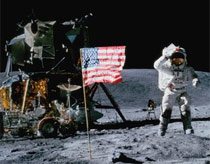Why do astronauts swim poorly in the air?
The weightless environment in the universe causes astronauts to estimate the wrong distance and size.
 The new revelation of the French and American science groups can explain astronauts' mistakes and accidents when performing missions in the universe.
The new revelation of the French and American science groups can explain astronauts' mistakes and accidents when performing missions in the universe.
NASA has long suspected that there is something wrong with the human's ability to perceive the world while in the universe. Some Apollo astronauts reported they had difficulty estimating the distance on the moon, such as distant rocks and cubes that looked closer to reality.
It is well known that shuttle pilots who landed during training with model aircraft are better than when they land.
Some experts have speculated that these effects may be the result of the lack of visible eye markers, such as trees or houses. However, new research accuses the lack of gravity.
To navigate in three-dimensional space, we need to use otolith - small CaCo3 crystals and moving proteins on the hairs in the inner ear. The pressure on these particles when people move means they sense the acceleration and gravity of gravity.
But when living in a zero gravity environment, this process will be affected. "When moving in the universe, this sensing system will not tell you whether you are inclined," said Gilles Clément, from the French National Center for Scientific Research, the team leader.
This, he says, affects the astronaut's perspective on perspective, and makes them misjudge the familiar landmarks that are used to sense the distance, like the object's disappearance point. This leads to them being unable to accurately assess the size of the object.
The experiment was done on an Airbus aircraft, tumbling continuously in a parabolic way to create weightless periods lasting 20 seconds, which proved it.
- Why don't you learn how to swim forever?
- Beautiful people swim with sharks
- Dolphins cannot swim too fast
- Towards Mars, NASA astronaut will wear swimming goggles into the universe?
- Swim in the North Pole to warn the climate to warm up
- Thousands of children swim close to each other but without collisions, what is the secret of fish?
- French athletes swim 8,850km across the Pacific
- Monkey learns to swim like people
- Build a robot that can swim frogs
- The ancient conception of human piracy
- Knowing that being an astronaut is difficult, but no one thinks it is so hard
- Why can dolphins just sleep, just ... swim?
 Van Allen's belt and evidence that the Apollo 11 mission to the Moon was myth
Van Allen's belt and evidence that the Apollo 11 mission to the Moon was myth The levels of civilization in the universe (Kardashev scale)
The levels of civilization in the universe (Kardashev scale) Today Mars, the sun and the Earth are aligned
Today Mars, the sun and the Earth are aligned The Amazon owner announced a secret plan to build a space base for thousands of people
The Amazon owner announced a secret plan to build a space base for thousands of people